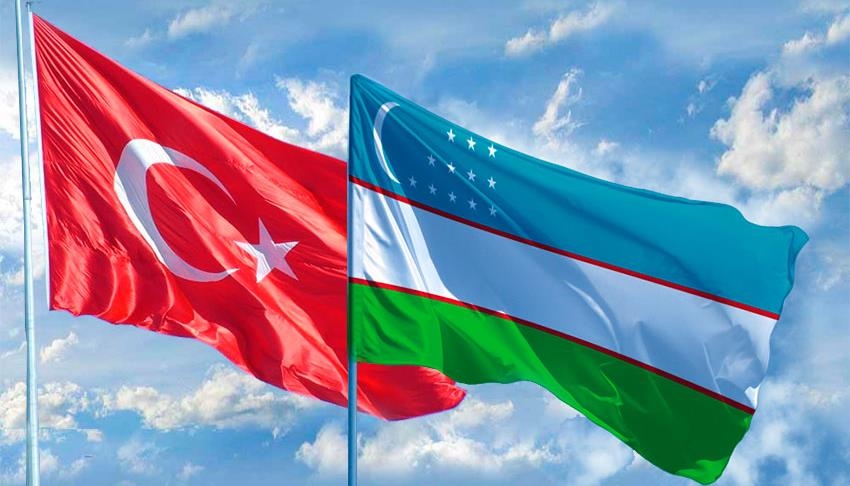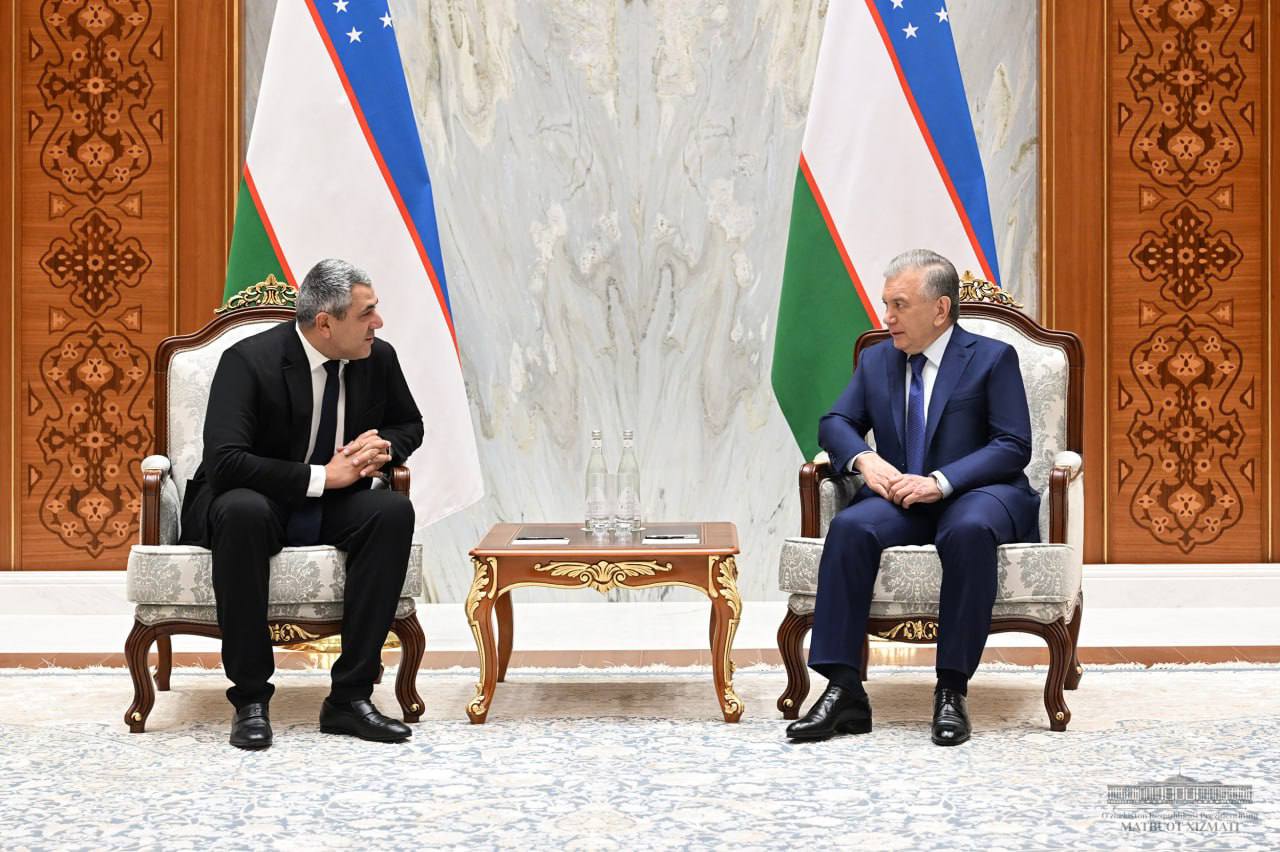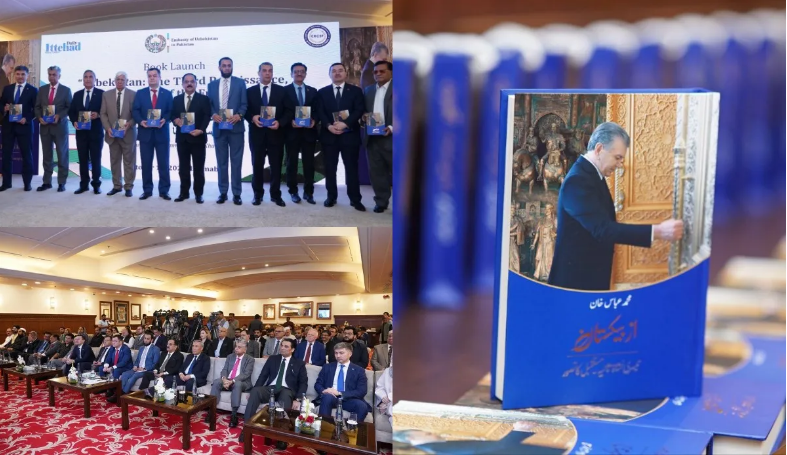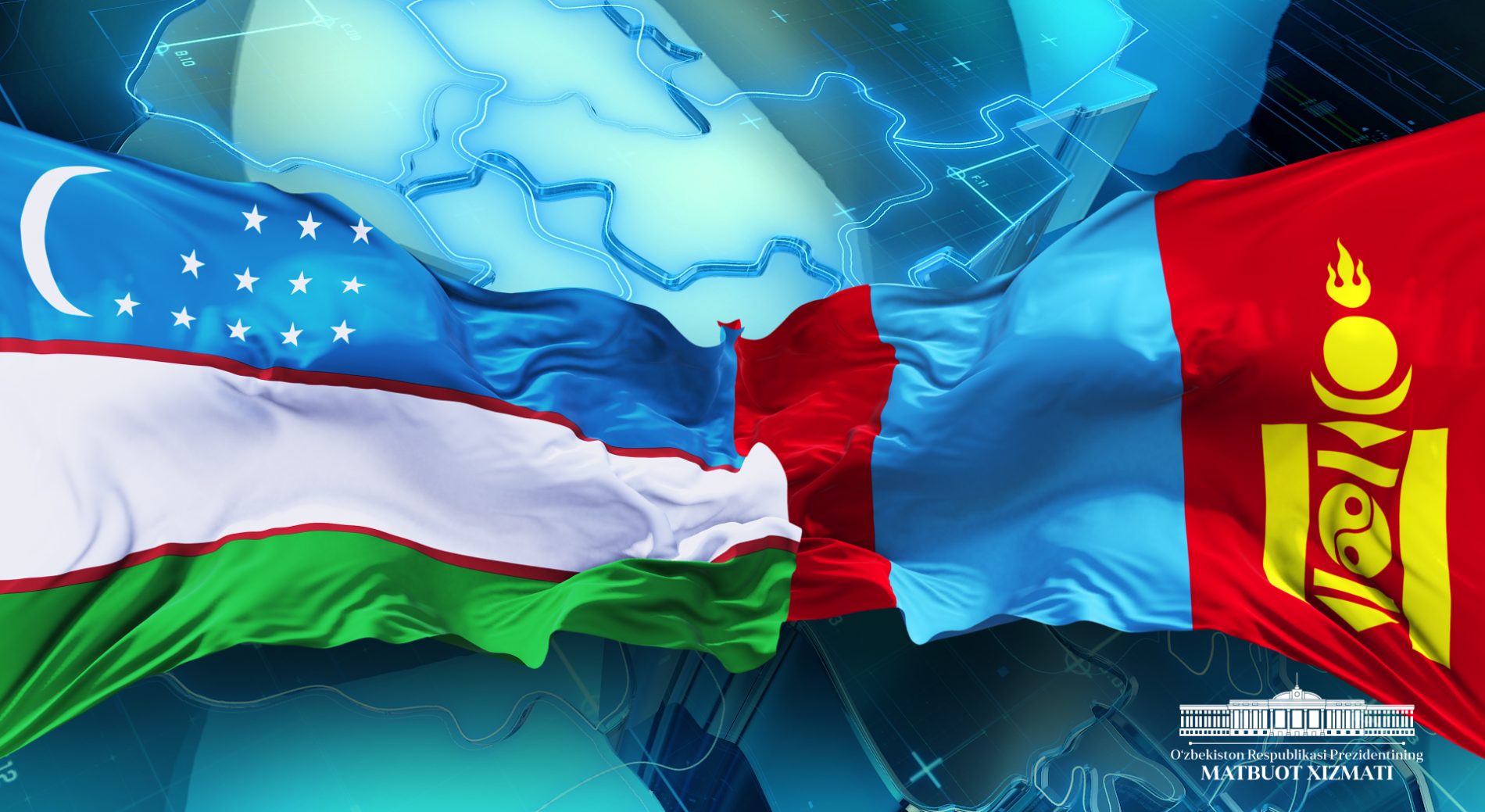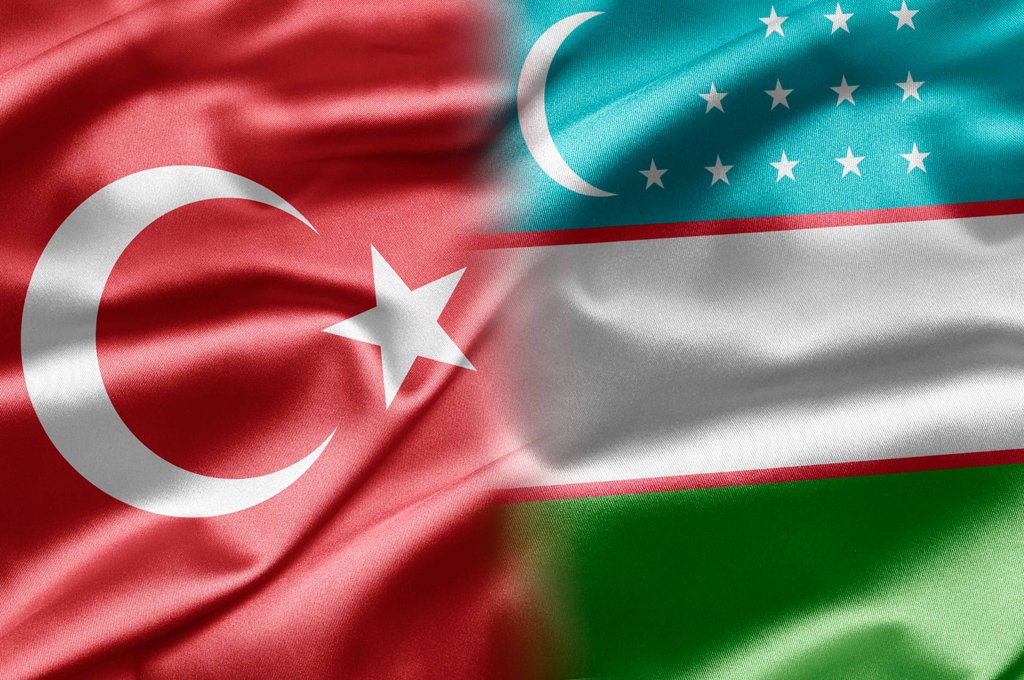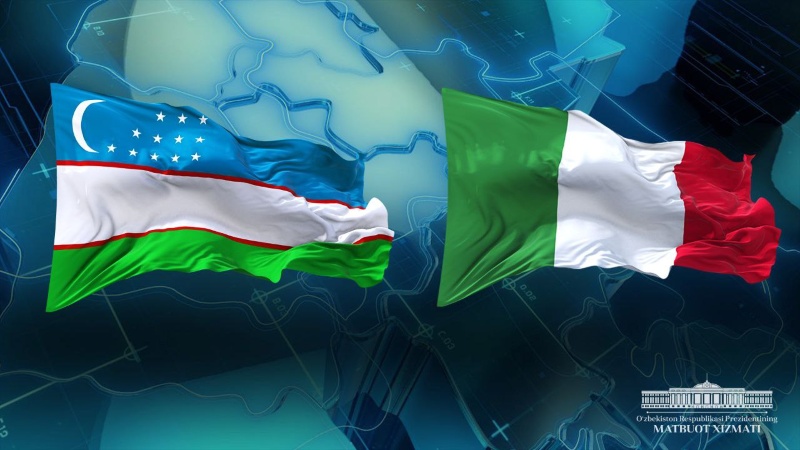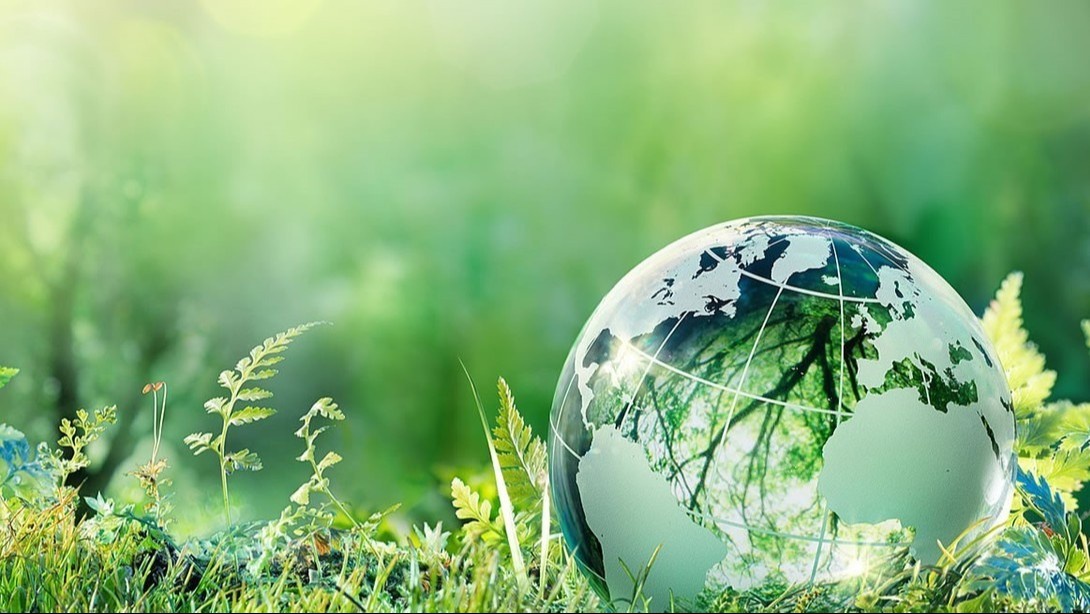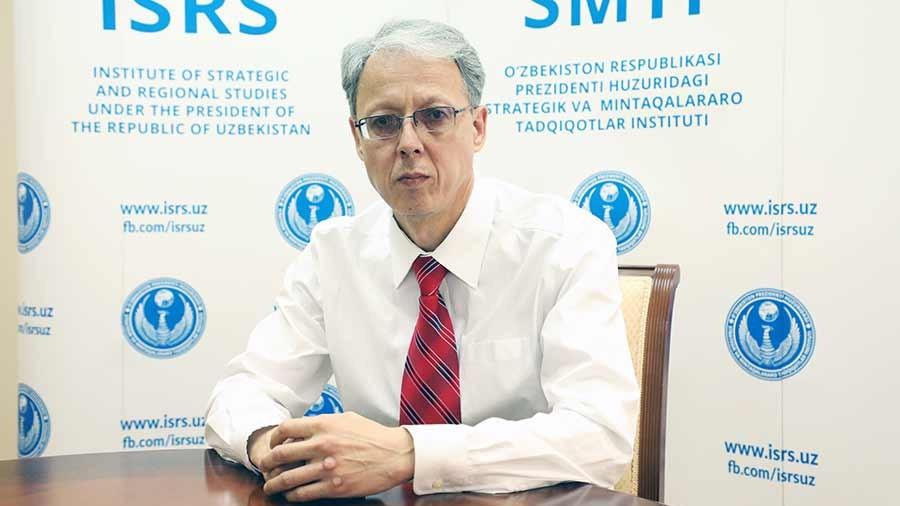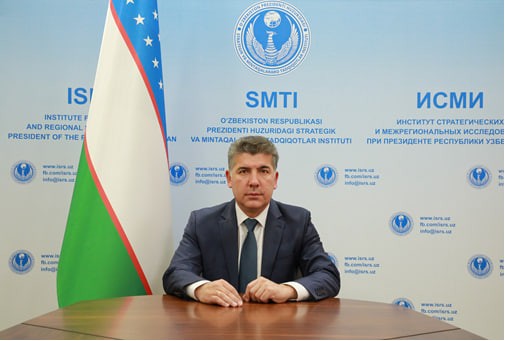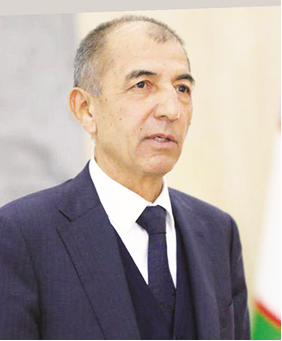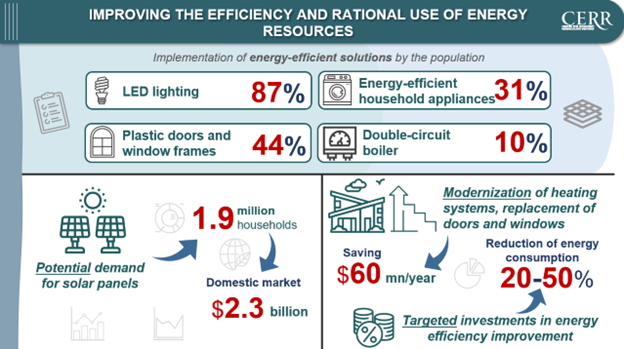Phone
Consular Issues
Phone
Uzbekistan news
We recommend
Uzbekistan-Turkey: A New Stage of Cooperation and Prospects for Developing Cultural and Humanitarian Ties
📅 28.01.2026
It is worth noting that one of Uzbekistan’s greatest achievements since independence has been ensuring peace, interethnic harmony, and mutual understanding among its multinational population. In particular, the wise national policy developed in our country in recent years is based on the key idea: “Multinationality is the wealth of Uzbekistan”.
It should be emphasized that cooperation between Uzbekistan and Turkey is currently gaining increasing significance in both quantitative and qualitative terms. Relations between the two countries, as a truly new stage of strategic cooperation, clearly demonstrate that historically and today, the Turkish and Uzbek peoples are truly fraternal peoples, not only in ethnic origin but also in spirit. Despite all the changes in historical development, these two fraternal peoples are steadily and diligently strengthening their national statehood, implementing the necessary reforms to remain competitive in a rapidly changing world. In this context, Turkey’s developed industry, achievements in agriculture, tourism potential, extensive statehood experience, and the growing natural interest of Turkish investors in the Uzbek market are of great importance to our country.
This closeness and commonality of approaches are the most reliable guarantee that the development of cultural and humanitarian ties between Uzbekistan and Turkey will continue to strengthen and deepen in the future, for the benefit of the Uzbek and Turkish peoples.
In particular, this is due to the age-old bonds of friendship, brotherhood, and mutual understanding between the Uzbek and Turkish peoples, as well as the similarity of culture, religion, and traditions of the peoples of both countries. This also demonstrates that these relations have deep historical and cultural roots, which provide a solid foundation. Moreover, culturally and historically, these two countries played a central role in the development of the civilization of the Turkic peoples. Therefore, at the 7th summit held in Baku on October 15, 2019, Uzbekistan’s accession to the Cooperation Council of Turkic-Speaking States as a full member was highly praised and greeted with enthusiasm by all participating states. It is no exaggeration to say that this event not only strengthened the spirit of brotherhood in the Turkic world but also led to the emergence of a new regular cooperation format between Ankara and Tashkent.
At the 8th Summit of the organization, held in Istanbul on November 12, 2021, its name was changed to the Organization of Turkic States. The Summit also approved the concept of the Turkic world through 2040. President of Uzbekistan Shavkat Mirziyoyev proposed holding the first summit of the Organization of Turkic States in Uzbekistan in 2022. The proposal was accepted, and the next, 9th summit of the organization was held in Uzbekistan in November 2022.
It is important to emphasize that in 2022, the leaders of the two countries celebrated the 30th anniversary of the establishment of diplomatic relations and the 5th anniversary of the establishment of a strategic partnership. Our view is supported by the agreement to strengthen cooperation on reforms in Uzbekistan, implement public-private partnership mechanisms, and deepen partnerships in science, education, art, cinema, tourism, and information.
Furthermore, President of the Republic of Uzbekistan Sh. M. Mirziyoyev is actively implementing a large-scale reform program aimed at expanding Uzbekistan’s economic opportunities and improving the well-being and living standards of the population. The success of this policy, to some extent, depends on elevating our country’s effective relations with its international partners to a qualitatively new level. The special attention is deserved that Uzbekistan is responding to fundamental global changes with a new, proactive, pragmatic, and constructive foreign policy.
The goals of modernizing our country’s economy and enhancing its global competitiveness require strengthening cooperation with foreign partners in industrial cooperation, studying the experience of developed countries, and attracting large-scale foreign investment and high technology. In this regard, notable that the economic development strategies of Uzbekistan and Turkey can complement each other in a number of important areas. This is due to the fact that Turkey is among the 20 largest economies in the world and has achieved high results in such important sectors for Uzbekistan as tourism, textiles, automotive manufacturing, construction, and food processing.
Especially, Turkey’s textile and jewelry industries are among the top five in the world. Forty-four Turkish building contractors are among the world’s top 250 construction companies. This ranks Turkey second only to China, one of the world’s leading economies. While the country’s food industry has successfully entered Western markets and strengthened its position there, the Turkish automotive industry is on the cusp of transitioning from conventional automobile production to mass production of domestically produced electric vehicles. This once again confirms that Turkey is an important economic partner for us. Laying the foundations for a completely new export-oriented economic development model in the New Uzbekistan requires systemic changes across all economic sectors and further strengthening ties with reliable external partners with whom industrial cooperation can be developed in these sectors.
Thus, in recent years, in a historically short period of time, a solid foundation has been laid for revolutionary changes in Uzbek-Turkish relations that will last for centuries — important programmatic plans have been developed and decisive practical steps have been taken. There is no doubt that this development of relations will further enhance the prestige of Uzbekistan and Turkey on the international stage, ensure stable economic growth in both countries, the socioeconomic well-being of their peoples, and the full realization of their creative potential.
Turkey and Uzbekistan are actively developing not only bilateral relations but also cooperation in multilateral formats. Participation in the Organization of Turkic-Speaking States is also an important component of international cooperation between Uzbekistan and Turkey.
Currently, Uzbekistan has created ample opportunities for citizens of more than 130 different nationalities to actively participate in socioeconomic, political, legal, spiritual, and educational life, to recognize their national identity, and to preserve their ethnic values. Also, interethnic harmony and religious tolerance, national unity and solidarity are envisaged, and, above all, the upbringing of a harmoniously developed generation that understands its national identity based on a rich historical and spiritual heritage, national values, customs and traditions, possesses a high sense of national pride and has a worldview formed on the basis of universal human values, modern technology, and scientific achievements.
Currently, in the New Uzbekistan, unity and mutual understanding are the main principles of policy in the sphere of interethnic relations, aimed at maintaining unity and harmony in society, where an important aspect is not only protecting the interests of various ethnic groups but also shaping a civic identity based on respect and consideration for the rights of others.
In the area of interethnic relations, Decree No. DP-52 of the President of the Republic of Uzbekistan as of March 19, 2025, “On measures to advance to a new stage in strengthening nationwide unity and relations with compatriots abroad”, was adopted. In this decree, the harmonization of interethnic relations in society and the formation of a unified civic identity through strengthening friendship, mutual solidarity, tolerance, and unity in society are defined as one of the priority tasks for strengthening national harmony and ties with compatriots abroad.
The Committee is designated as the authorized republican executive body implementing state policy in the area of interethnic relations, supporting compatriots abroad, and coordinating the activities of state bodies in this area.
The Committee’s primary objectives are: harmonizing interethnic relations, forming a unified civic identity by strengthening friendship, mutual solidarity, tolerance, and unity in society; strengthening the involvement of all nationalities and peoples living in Uzbekistan in national development by ensuring their rights and legitimate interests; developing socio-cultural and friendly ties with foreign countries through public diplomacy; supporting the mobilization of the socio-economic potential of compatriots abroad for the development of our Homeland; and systematically analyzing issues of national unity among the people of Uzbekistan and compatriots abroad in the name of common societal goals.
The Committee has taken significant steps to develop cooperation with the USA, Canada, China, Azerbaijan, Turkey, and several other countries to elevate the consistent implementation of state policy toward compatriots living abroad to a new level.
Currently, the Committee implements state policy aimed at ensuring interethnic harmony and tolerance in society and supporting the mobilization of the socio-economic potential of compatriots abroad for the development of our country. It also establishes friendly international relations, strengthens friendship with civil societies in foreign countries, and implements a “public diplomacy” mechanism with 157 national cultural centers, 43 friendship societies located in the republic, as well as with more than 60 brother cities, and nearly 100 societies of compatriots abroad.
Enormous opportunities have been created for the preservation, presentation, and development of national identity, language, traditions, customs, history, and culture of various nationalities. Furthermore, the role of national cultural centers, established by representatives of various nationalities living in our country is of particular importance in strengthening cultural cooperation between the New Uzbekistan and foreign countries.
Specifically, Turkish National Cultural Centers were established in Bukhara in 1991, in Tashkent - in 1992, and in 1997, the Turkish National Cultural Center of Uzbekistan.
Since 1997, the primary focus of the Turkish National Cultural Center of Uzbekistan (chairman Umar Ibrahimov Salmanov) has been the revival of the Turkish language, culture, traditions, and customs. To this end, the Center has established a Council of Elders, a Women’s Council, a Youth Wing, and a department for working with sports clubs and ensembles.
Currently, three folklore ensembles operate under the auspices of the Center: Sevinch, Anadolu, and a women’s folklore group.
In 1999, under the direction of Mikail Suleymanov, an honorary member of the Turkish National Cultural Center of Uzbekistan, the MIKO Comedy Theater was founded. The performances were shown in Russia, Kazakhstan, Kyrgyzstan and Azerbaijan. These theatrical productions are primarily aimed at strengthening unity, solidarity, and harmony among representatives of different nationalities.
A number of representatives of Turkish nationality have been awarded state awards for their contribution to strengthening interethnic harmony, mutual understanding, and friendship in our country.
The first information about the arrival of Turks in Uzbekistan was found in the diary of the Spanish ambassador González de Clavijo. Written sources mention Turkish musicians at the court of the Temurid Shahrukh. There is information that Turkish merchants and artisans settled in the territory of modern-day Uzbekistan in the late Middle Ages to engage in trade and crafts.
When did the Turks arrive in Uzbekistan? We pondered this question for a long time, examining over 100 sources. The results yielded varied answers. The first representatives of the Turks settled in the territory of modern-day Uzbekistan, in the lands of Akhsi, which corresponds to the territory of today’s Namangan Region, when Turkic peoples migrated from the Yenisei River to the state known today as Turkey. The second group arrived during the reign of Amir Timur, in the 1400s.
In 1992, the number of Turks living in Uzbekistan was 21,000, while today it has exceeded 50,000.
Currently, our citizens of Turkish nationality living in Uzbekistan actively participate in the political, economic, social, and cultural life of the republic, making a worthy contribution to the development and progress of the state.
The visit of the President of Uzbekistan to Turkey ushered in a new era in the comprehensive strategic partnership between the two countries, based on mutual trust and expressing a desire for long-term, mutually beneficial cooperation for the benefit of our peoples.
Official visits by the leaders of the two countries contribute to strengthening political dialogue and demonstrate a fruitful practical partnership. To further develop bilateral cooperation, the parties discussed in detail priority areas for further expansion of their partnership, including in areas such as trade and economics, investment, transport, textiles, energy, agriculture, as well as cultural and humanitarian exchanges.
Furthermore, in accordance with the Action Plan for 2026-2027 signed between the Ministries of Foreign Affairs of Uzbekistan and Turkey, the most effective cooperation aimed at ensuring sustainable development and prosperity based on lasting security has been established.
It is noteworthy that the first part of the book by President of Uzbekistan Shavkat Mirziyoyev, “Modernity and the New Uzbekistan
is entitled “Humanity’s Chosen Path of Sustainable Development”. The fact that it reflects the priority criteria for human development in the 21st century and the noble global goals outlined in the 2030 Agenda for Sustainable Development confirms our aforementioned ideas.
Overall, the primary and most important factor in maintaining socio-political stability in Uzbekistan is the ability to ensure unity and national harmony among its multi-ethnic population. It should be noted separately that national understanding and national unity, which are strengthening day by day in our society, serve the cohesion processes on an ethnic and cultural basis among representatives of all nationalities living in Uzbekistan.
Saodat Tilovberdievna Davlatova
Head of Department of the Committee on interethnic relations and compatriots abroad of the Republic of Uzbekistan,
Doctor of Historical Sciences, Professor
The President of Uzbekistan held a meeting with the Secretary-General of UN Tourism
📅 15.06.2024
President of the Republic of Uzbekistan Shavkat Mirziyoyev met with Secretary-General of UN Tourism (World Tourism Organization) Zurab Pololikashvili, who is in our country on a working visit, in Samarkand on June 15.
The sides discussed issues related to further expansion of Uzbekistan's multifaceted cooperation with this specialized UN institution.
The course of implementation of agreements reached and initiatives put forward at the 25th session of the organization's General Assembly, which was held in Samarkand in October 2023, has been reviewed. The UN General Assembly's adoption of the resolution initiated by Uzbekistan on declaring 2027 the International Year of Sustainable and Resilient Tourism was highly appreciated.
It was noted with deep satisfaction that the organization is a strategic partner of Uzbekistan in the development of modern tourist infrastructure and popularization of tourist destination to our country.
It was noted the importance of continuing joint efforts to implement programs and projects aimed at creating comfortable conditions and facilities for tourists, development of pilgrimage and cultural and cognitive tourism, including domestic tourism.
Special attention was paid to the issues of training qualified personnel in the field of hospitality and service with the effective use of opportunities of the International Academy of Tourism operating in Samarkand.
In order to popularize the tourist destination in Uzbekistan, practical interaction will be expanded in the issues of supporting the participation of domestic tour operators in major international tourism fairs and exhibitions.
Pakistan hosts presentation of the book – “Uzbekistan: Third Renaissance – Concept of the Future” in Urdu
📅 06.11.2025
A presentation of the literary and publicistic collection “Uzbekistan: Third Renaissance – Concept of the Future” was held in Islamabad, written in Urdu by renowned Pakistani journalist and author Muhammad Abbas Khan, explores Uzbekistan’s modern development vision and reform agendat.
The collection offers a comprehensive analysis of the essence, spiritual foundations, and global significance of Uzbekistan’s vision for a New Renaissance — the foundation of the country’s Third Renaissance — under the leadership of President Shavkat Mirziyoyev. The book elaborates on the concept advanced by the Head of State, tracing its historical roots and outlining its relevance for the future of human civilization. The author emphasizes that this vision draws inspiration from the legacy of Uzbekistan’s great ancestors and seeks to unite the principles of modern development, enlightenment, and humanism, serving as a bridge between the nation’s rich intellectual past and its forward-looking aspirations.
The collection also highlights the shared initiatives and common aspirations of the leaders of Uzbekistan and Pakistan to advance major transport and communication projects linking Central and South Asia. According to the author, these efforts represent the revival of the legendary Silk Road. The book not only describes the sweeping reforms and modernization taking place in Uzbekistan, but also emphasizes that the development path of the “New Uzbekistan” may serve as an inspiring model for Pakistan and the wider Eastern world.
The presentation ceremony brought together members of Pakistan’s government and parliament, representatives of the diplomatic corps accredited in Islamabad, prominent scholars, analysts, public figures, and media representatives. Attaullah Tarar, Federal Minister for Information & Broadcasting of Pakistan, attended the event as the guest of honour.
The presentation opened with the national anthems of Uzbekistan and Pakistan, followed by a video highlighting the nine years of Shavkat Mirziyoyev’s leadership as a President of Uzbekistan.
The event commenced with welcoming remarks by Alisher Tukhtaev, Ambassador of Uzbekistan to Pakistan. In his address, the Ambassador emphasized that, under the leadership of President Shavkat Mirziyoyev, Uzbekistan has entered an era of openness and creative transformation.
He noted that over the past nine years, the country has implemented comprehensive reforms across the socio-economic, political, educational, and cultural spheres. As a result, Uzbekistan’s Gross Domestic Product has doubled, reaching 115 billion US dollars; exports have risen to 26 billion dollars; and foreign investments have exceeded 130 billion dollars. Thousands of new enterprises have been established, reflecting the dynamic pace of development and modernization.
It was noted that relations between Uzbekistan and Pakistan have been elevated to the level of a strategic partnership, with the establishment of the High-Level Strategic Cooperation Council. Direct air connections now link Tashkent with Islamabad and Lahore, while collaboration in the fields of education and culture continues to expand rapidly.
Particular attention was given to the Trans-Afghan Railway Project — recognized as a strategic initiative aimed at strengthening peace, mutual trust, and economic connectivity across the region, effectively reconnecting Central and South Asia.
Ambassador Alisher Tukhtaev expressed his sincere gratitude to the author of the featured work, Muhammad Abbas Khan, and to the management of “Daily Ittehad” publishing house for their contribution to the creation and publication of the book. He emphasized that this work will make a valuable contribution to fostering friendship and solidarity between the peoples of Uzbekistan and Pakistan.
In turn, Tahir Farooq, head of “Daily Ittehad” publishing house, expressed his satisfaction with the publication of the book “Uzbekistan: Third Renaissance – Concept of the Future”.
“This book is not merely a compilation of facts about Uzbekistan”, - he noted, - but an important work that vividly reflects the ongoing processes of reform and renewal in the country. It is not a collection of speeches or a translation of another author’s work, but the result of five years of observation and analysis by Muhammad Abbas Khan. His insights carry great significance for understanding Uzbekistan’s contemporary path of development. The book also serves as an important historical document of the new era unfolding in Uzbekistan”.
In his address, Attaullah Tarar, Minister for Information and Broadcasting of Pakistan, highlighted the deep historical ties between the peoples of Uzbekistan and Pakistan, noting that the land of Uzbekistan has produced eminent figures of the Timurid dynasty, including the distinguished scholar and statesman Zahiriddin Muhammad Babur. The Minister emphasized that the region connecting Central and South Asia has always been a vital part of the Great Silk Road, and that Uzbekistan’s contemporary policy under the leadership of President Shavkat Mirziyoyev is focused on revitalizing this historic corridor of cooperation.
Concluding his speech, Minister Attaullah Tarar reaffirmed the readiness of Pakistan’s Ministry of Information and Broadcasting to extend full support in promoting the book and the “Third Renaissance” initiatives advanced by President Shavkat Mirziyoyev to the Pakistani public.
In his address, author Muhammad Abbas Khan discussed the process of writing the book, the ideas it conveys, and its principal objectives. According to the author, the work is based on his research, observations, and personal impressions, providing an objective account of Uzbekistan’s ongoing processes of renewal and development.
“I have had the opportunity to directly observe the profound transformations taking place in Uzbekistan, the reforms being implemented under the leadership of President Shavkat Mirziyoyev, and the policies aimed at fostering an open society, enhancing human dignity, and advancing education and enlightenment, along with their tangible results. Today, Uzbekistan is experiencing a period of awakening. The concept of the Third Renaissance, being realized in Uzbekistan, serves as an example of a universal experience grounded in confidence in the future, scientific and spiritual renewal, and policies for the development of human potential”, - said Muhammad Abbas Khan.
The book “Uzbekistan: Third Renaissance – Concept of the Future” is expected to serve as a unique resource for familiarizing the Pakistani public with Uzbekistan’s new historical path of development, while further strengthening the cultural and spiritual bonds between the two nations.
President of Mongolia to pay state visit to Uzbekistan
📅 22.06.2024
At the invitation of President of the Republic of Uzbekistan Shavkat Mirziyoyev, President of Mongolia Ukhnaagiin Khurelsukh will pay a state visit to our country on June 23-26.
In accordance with the program of the high-ranking guest's stay, it is envisaged to hold high-level talks in Tashkent, during which issues of further expansion and strengthening of Uzbek-Mongolian relations of friendship and multifaceted cooperation will be considered.
In particular, the agenda includes plans to develop constructive political dialogue and inter-parliamentary contacts, increase bilateral trade turnover, implement cooperation projects in mining, agriculture, livestock, light industry, healthcare, transport, logistics and other areas. Joint measures aimed at boosting cultural, humanitarian and tourist ties will also be discussed. There will be an exchange of views on international issues.
A package of intergovernmental and interdepartmental documents will be signed following the results of the summit.
As part of the program of the state visit, the leaders of the two countries will meet with representatives of leading companies and business circles, and a number of other bilateral events will be held.
Mongolian President Ukhnaagiin Khurelsukh will also visit Khiva, where he will familiarize himself with the rich cultural and historical heritage of our people.
The development of Uzbek-Azerbaijani cooperation
📅 02.07.2025
Cooperation with colleagues from Azerbaijan is underway in this direction.
1. In the current geopolitical situation, there is a tendency of transition from traditional transportation routes to alternative, more reliable, involving the use of different modes of transport, which contributes to the growing attractiveness of multimodal transportation.
2. Uzbekistan's cooperation with Azerbaijan is strengthened
Uzbekistan – Turkey: The Practical Phase of Cooperation in the Forestry Sector
📅 29.01.2026
Today, one of the priority areas of state policy in Uzbekistan is focused on expanding forested areas, increasing green coverage, mitigating the negative impacts of climate change, and ensuring environmental sustainability. In order to achieve effective results in these areas, studying advanced foreign experience and adapting it to the country’s climatic conditions is of particular importance. In this context, the participation of a delegation of representatives of the Forestry Agency under the National Committee on Ecology and Climate Change of Uzbekistan in a training and practical seminar organized during their visit to the Republic of Turkey in October 2025 was of significant importance.
The seminar, organized in cooperation between the Forestry Agency and the Ministry of Agriculture and Forestry of the Republic of Turkey, enabled participants to familiarize themselves with Turkey’s experience in forest establishment, restoration, ecological classification, and sustainable forest management. In particular, on the first day of the seminar, Turkish specialist Ahmed Yalvach delivered a detailed presentation on modern approaches applied in the development of forestry.
Within the framework of the practical visit, Turkey’s advanced experience in establishing and managing nurseries, creating forests using the “terrace” method in mountainous areas, developing “green belts” around cities, and establishing green public parks in urban and district areas was studied.
In addition, members of the delegation closely examined the activities of nurseries operated by the Seydikemer and Gökova Forestry Departments located in Muğla Province. Notably, the Seydikemer nursery, established in 1983, covers an area of 144 hectares and has an annual production capacity of 1.5 million seedlings. The Gökova nursery, occupying more than 61 hectares, stands out with its capacity to produce up to 7 million seedlings per year.
It was emphasized that special attention to seed collection, storage, and laboratory analysis in these nurseries allows the production rate of high-quality seedlings and saplings to reach 90–95 percent. Participants studied the practical experience of Turkish specialists in establishing mother plantations, caring for seedlings and saplings, and grafting techniques.
The delegation members were also introduced to the use of greenhouses, in vitro laboratories, modern equipment, and mechanisms for managing seasonal work processes. The experience-sharing activities were conducted in an atmosphere of open dialogue and professional cooperation.
In conclusion, cooperation between Uzbekistan and Turkey in the forestry sector has acquired a practical dimension, contributing to the adoption of advanced practices, enhancement of specialists’ capacity, and the formation of a sustainable ecological environment in Uzbekistan. The knowledge and skills gained within the framework of this cooperation will play an important role in further improving the national forestry system.
On May 28-29, the Prime Minister of Italy will pay an official visit to Uzbekistan
📅 27.05.2025
Uzbekistan’s environmental initiatives are aimed at creating a healthy and sustainable environment in Central Asia
📅 26.07.2024
Due to the Aral Sea tragedy, the negative consequences of climate change are more acute in Central Asia. The increase in air temperature in our region is twice the world average. The number of extremely hot days is expected to double and the area of glaciers will shrink by a third. In the last 30 years, the rate of warming in Central Asia is higher than the global average, and the average annual temperature has increased by 0.5 degrees. According to forecasts, the temperature is expected to increase by 2.0-5.7 degrees by 2085.
Uzbekistan is making active efforts to improve the quality of the environment and prevent the negative consequences of environmental problems. In particular:
Within the framework of international cooperation
Currently, the need for international cooperation in the field of environmental protection is determined by the growing ecological interdependence of all countries. Ozon layer depletion, pollution of the atmosphere and oceans, and the rise in temperature on our planet affect the entire world community, not just the countries engaged in environmentally dangerous activities. Therefore, today, a number of countries have established cooperation with the United Nations Organization on issues of environmental safety.
Such cooperation is based on a number of principles generally recognized by the international community. They are partly reflected in interstate agreements and acts, normative documents of international organizations, and summarized in the decisions of the most important international conferences dedicated to environmental protection and the regulation of cooperation between states and peoples in this field.
Based on this, Uzbekistan is actively promoting important climate initiatives aimed at uniting the region to combat climate change. These ideas of the President of Uzbekistan Shavkat Mirziyoyev are constantly supported by the countries of the region.
As a logical continuation of the formation of a unified climate agenda for Central Asia, the initiative to develop a regional strategy for adaptation to climate change was announced by Uzbekistan at the 5th meeting of state leaders. In addition, the Head of Uzbekistan proposed to establish a multilateral platform at the level of the ministers of ecology - "Central Asian climate dialogue", which can be an integrating link in the path of "green" development in Central Asian countries.
In addition, President Shavkat Mirziyoev put forward a number of proposals at the United Nations Climate Change Conference (COP28). In particular, our country's President advocated for an expeditious agreement on the Global Framework for Climate Adaptation within the framework of the Paris Agreement. At the same time, he noted the need for a fair, transparent and inclusive transition to a low-carbon economy on a global scale, in which the interests of developing countries must be taken into account. He proposed to consider this urgent problem on a permanent basis, including within the framework of the "G7" and "G20" summits.
Within the framework of environmental reforms in our country
A strategy for the transition to a «green» economy
Uzbekistan adopted the strategy of transitioning to a "green" economy for 2019-2030. The main goals of this strategy are:
Preservation of natural resources: Modernization of irrigation systems, introduction of water-saving technologies.
Use of alternative energy sources: Expanding the use of solar, wind and biomass energy.
Introduction of cost-effective means in economic sectors: Improving energy efficiency in manufacturing and service sectors.
Improvement of environmental legislation
Legislation is also being improved to ensure environmental stability in Uzbekistan. These laws are aimed at providing legal groundwork to the reforms implemented in the fields of environmental protection and ecological stability.
Project "Restoration of sustainable forest landscapes in Uzbekistan"
The project "Restoration of sustainable forest landscapes in Uzbekistan" is being implemented in collaboration with the International Development Association. The cost of the project is more than 205 million dollars and it will be implemented within 6 years. It is important that the goals of the project include such tasks as expanding the territory of forests, strengthening the material and technical base of forestry, introducing sustainable management and developing the infrastructure of ecotourism.
"Uzbekistan - 2030" strategy
In the "Uzbekistan-2030" strategy adopted by the Decree of the President of Uzbekistan on September 11, 2023, reforms in the framework of water resources conservation and environmental protection are set as one of the priority goals. A number of measures are envisaged within the framework of the strategy, and they are being effectively implemented. In particular,
National project “Yashil Makon” ("Green Zone").
The Decree of the Cabinet of Ministers No.144-F of March 7, 2024 was adopted in order to implement the activities of the nationwide project "Green Space" in 2024. This project included a number of important initiatives aimed at improving the environmental situation in Uzbekistan and expanding green areas.
138.1 million tree saplings were planted in the spring planting season of 2024 within the "Green Zone" national project. This indicator made 110.5 percent compared to the planned one. This part of the project is aimed not only at environmental improvement but also at improving the aesthetic appearance of our cities.
"Green Parks" and "Green Belts"
In particular, 257 "Green Parks" were established, their total number reached 517. Also, "Green Belts" were established by planting 5.3 million tree saplings in and around industrial enterprises. These efforts were made to reduce the impact of industrial enterprises and protect the environment.
Initiatives of organizations and agencies
Ministries and agencies are also contributing to the aforementioned work. In particular, the Ministry of Defense created a park of 100 hectares, the Ministry of Digital Technologies and the Ministry of Mining and Geology — 65 hectares. These efforts are critical to ensuring the comprehensiveness and sustainability of the project.
Tree planting and waste recycling
In our country, trees have been planted near highways and railways, on river and canal banks, at industrial enterprises and gas stations. These are especially aimed at reducing the negative impact of transport and industry on the environment.
On average, 6.8 million tonnes of household waste are produced in our country per year. In recent years, the number of neighbourhoods covered by sanitation services has increased by more than 90 percent. The level of waste processing was 38.1 percent as of July 1, 2024, and the number of such enterprises was 313 as of February.
Waste treatment and landfills
A new system for the regulation of landfills and waste processing is being launched. In each region, 3-4 landfills with a convenient location are being turned into special eco-industrial zones, and recycling projects are being implemented. In the remaining landfills, a new practice is being used to start temporary waste collection and reloading stations. The landfills that exhausted their resources are closed, poplar, mulberry, elm and maple trees are planted around them, and "green belts" are being established.
Avazbek Kholbekov,
Head of Department – Development Strategy Centеr
Uzbekistan and Finland: Similar Approaches to Building Good-Neighborly Regional Relations
📅 06.11.2025
In an era characterized by growing disunity among global powers, the strategies employed by so-called “middle” states in forging stable regional relations present promising solutions for achieving international peace and cooperation. Uzbekistan, a Central Asian nation situated at the heart of the historic Silk Road, and Finland, a Nordic state with a unique experience as a neutral border state during the Cold War, exemplify how a consistent commitment to dialogue can contribute to regional stability amidst the complexities of global relations.
Geographically separated, these countries have developed strikingly similar approaches to ensuring sustainable development, peace, and stability in their regions. They address key regional security challenges by strengthening multifaceted and mutually beneficial good-neighborly relations with their neighbors. Additionally, they engage in multilateral, long-term partnerships with interested countries and organizations.
While Uzbekistan and Finland have been shaped by different historical contexts, these experiences have contributed to the development of a shared diplomatic philosophy centered around stability, cooperation, sovereign equality, mutual respect, and multilateral interaction.
Central Asia, a region steeped in ancient history, has long been a cultural and historical hub. Centuries ago, it was a unified space where politics, economics, and culture intertwined seamlessly. As one of the cradles of human civilization, Central Asia boasts a rich tapestry of history and a vibrant cultural heritage that has shaped universal values. These values emphasize cooperation over confrontation, tolerance over imposition, and the belief that the well-being of neighbors is intrinsically linked to one’s own.
Since gaining independence in 1991, Uzbekistan has consistently championed a policy of regional interaction. This policy, which gained prominence under President Shavkat Mirziyoyev in 2016, became a cornerstone of Uzbekistan’s foreign policy. Tashkent’s “diplomatic offensive” to enhance intra-regional cooperation became one of the most significant policy changes that transformed relations in modern Central Asia.
Tashkent’s unprecedented focus on dialogue and building trust with neighboring states has transformed Uzbekistan into the primary organizer of cooperation in the region. It has advocated for the development of multilateral interaction mechanisms, spanning various domains such as water resource management, transport corridor expansion, industrial cooperation, border demarcation, and regional security.
The positive impact of these policy changes has reverberated throughout the entire region. After 2016, economic cooperation witnessed a remarkable surge, leading to a nearly doubling of the total GDP of Central Asian states from $273 billion to $520 billion. Trust and strengthened ties between countries have facilitated a 4.5-fold increase in intra-regional trade, soaring from $2.4 billion to $11 billion. Moreover, the number of tourists visiting the region has doubled, further boosting its appeal.
The collective openness and enhanced stability have become attractive factors for third countries, resulting in a significant increase in the region’s foreign trade. This growth has seen a remarkable rise of over 200 percent, from $112 billion to $253 billion.
Finland’s diplomatic traditions were shaped by its unique position at the crossroads of Eastern and Western “spheres of influence.” Its vulnerable geographical location drove its pursuit of interaction and stability.
Finland consistently advocates for strengthening friendly relations with all countries, particularly its neighbors, and fostering ties within Nordic cooperation structures like the Nordic Council, the Council of Ministers of the Nordic Countries, and the Nordic Investment Bank.
This approach is reflected in Finland’s active involvement in the OSCE with aims to enhance dialogue and trust.
Finland’s 2025 OSCE chairmanship, coinciding with the 50th anniversary of the Helsinki Final Act, holds symbolic significance. It exemplifies Finland’s commitment to building bridges, fostering dialogue, and cultivating trust, aligning with its dialogue-based foreign policy. Finnish diplomacy consistently emphasizes the importance of strengthening common positions and approaches among states, reflecting Finland’s consensus-oriented diplomatic style, which Uzbekistan shares as well.
It’s worth noting that both countries adhere to the same fundamental principles of international law. Respect for national sovereignty, non-interference in internal affairs, and the inviolability of borders serve as practical guidelines shaping Uzbekistan and Finland’s foreign policy, regional behavior, and international positioning.
Tashkent’s approaches to regional interaction resonate with Helsinki’s priorities for cooperation with the Nordic and Baltic countries. Uzbekistan’s efforts in resolving border disputes and collaborating on water resources in the region mirror Finland’s approach to peacebuilding and fostering cooperation.
Furthermore, both countries have established themselves as advocates of results-oriented cooperation. They are pragmatic architects of projects that create mutual benefits and strengthen regional stability and interregional connectivity.
Under the leadership of President Sh. Mirziyoyev, Uzbekistan is actively promoting the development of transport infrastructure within Central Asia and with neighboring regions, including the West, East, and South. For instance, the development of the “Middle Corridor” (Trans-Caspian International Transport Route) has led to a remarkable six-fold increase in cargo shipments along it over four years, from 2020 to 2024, reaching a substantial volume of 4.5 million tons. Tashkent is also actively involved in the construction of the China-Kyrgyzstan-Uzbekistan railway and is promoting connectivity between Central and South Asia.
Economic cooperation and environmental protection are additional pillars of Uzbekistan’s regional strategy. These aspects play a crucial role in Uzbekistan’s environmental programs, particularly in mitigating the consequences of the Aral Sea disaster.
Finland, following a similar pattern of project-oriented cooperation, has been an active participant in initiatives of the Nordic Council and the Barents Euro-Arctic Council. These initiatives encompass cross-border cooperation in environmental protection, innovation, and people-to-people contacts. Finland also promotes initiatives of the Trans-European Transport Network and Arctic connectivity.
Known for its leadership in environmental protection, Finland actively participates in cross-border economic projects with partners from the Nordic and Baltic countries.
Alongside their close cooperation with countries in their respective regions, Uzbekistan and Finland pursue a policy of strategic multilateralism. Both countries actively participate in various regional and global institutions, reflecting their shared views that modern challenges require collective responses. They believe that “middle powers” can exert effective influence through institutional engagement.
Since 2016, Uzbekistan has significantly increased its involvement in regional organizations, primarily the Shanghai Cooperation Organization (SCO), the Organization of Turkic States (OTS), and various United Nations bodies.
Additionally, the “Central Asia +” (C5+1) platform, now comprising over 10 partner countries and organizations, actively promotes interregional cooperation. Notably, the inaugural “Central Asia – European Union” summit held in April 2025 resulted in an agreement on “deep and comprehensive cooperation” between the two regions.
Finland’s international engagement, while having a longer history, also follows a similar pattern of active institutional participation. As a member of the European Union since 1995 and multiple international organizations, Finland maintains its traditional interactions with regional structures in Northern and Baltic Europe.
As the international landscape becomes increasingly intricate, Uzbekistan and Finland encounter similar challenges that test their historically established unique diplomatic approaches.
Uzbekistan faces the primary challenge of sustaining the momentum for deepening regional partnership and intensifying cooperation with external actors amidst escalating geopolitical tensions, environmental threats, and economic shocks.
From Uzbekistan’s perspective, responding to the changing geopolitical landscape and the economic transformation needs of Central Asia requires strengthened cooperation, both among Central Asian countries and between regions.
Finland’s challenge lies in finding a balance between its commitments within the EU and NATO and its traditional role as a mediator in building consensus and dialogue, particularly in organizations like the OSCE, where it continues to promote “strengthening dialogue and trust.”
Overall, Uzbekistan and Finland exemplify successful regional cooperation based on a consistent commitment to dialogue and interaction. Despite their distinct geographical and historical contexts, both countries have adopted similar foreign policy approaches focused on conflict prevention, institutional engagement, and pragmatic regionalism.
In an interconnected world characterized by great power rivalry, the diplomatic approaches of Uzbekistan and Finland serve as a reminder that sustainable security and prosperity are achieved through dialogue, cooperation, and practical collaboration, rather than diktat, isolation, or empty rhetoric.
And unsurprisingly, these foreign policy approaches positively impact the lives of their citizens. It’s not a coincidence that Finland consistently ranks as the “happiest country in the world” for the eighth consecutive year in the World Happiness Report. Similarly, Uzbekistan leads in the level of happiness among Central Asian countries in the same ranking.
Sharif Akhmedov,
Chief Researcher at the Institute for Strategic and Regional Studies under the President of the Republic of Uzbekistan
The dynamics of Uzbek-Turkish relations reflect pragmatism, mutual trust and a focus on concrete results.
📅 30.01.2026
The First Deputy Director of the Institute for Strategic and Regional Studies under the President of the Republic of Uzbekistan Akramjon Nematov shared this assessment, commenting on the results of President of the Republic of Uzbekistan Shavkat Mirziyoyev's visit to Turkiye.
According to him, the official visit of the Uzbek leader to the Republic of Turkiye, which concluded on January 29, 2026, should be viewed not only as another event on the bilateral political calendar, but above all as an important milestone in the institutional strengthening of Uzbek-Turkish relations. Its results convincingly confirmed that the interaction between Tashkent and Ankara, which was largely fragmented just a few years ago, has reached a qualitatively new level – the level of a comprehensive strategic partnership based on pragmatism and mutual benefit.
The personal role of President Shavkat Mirziyoyev in shaping this new quality of relations deserves special mention. His proactive policies and strategic approach have enabled bilateral cooperation to reach a systemic level, where pragmatism is combined with a long-term focus on sustainable development. Thanks to the President's initiative, visits and cooperation programs have become regular and institutionalized, and the agreements reached have begun to be implemented with clear planning and measurable results, strengthening trust between the countries and creating a reliable platform for economic, humanitarian, and technological ties.
Thus, the current visit's program, which included talks in narrow and expanded formats, as well as the fourth meeting of the High-Level Strategic Cooperation Council, demonstrated a high level of political trust and the maturity of the bilateral dialogue. While such meetings were previously held sporadically, today the Strategic Cooperation Council functions on a regular basis, ensuring the continuity of decisions and overseeing their implementation. Symbolically, the key events took place on the eve of the holy month of Ramadan and the 30th anniversary of the Treaty of Eternal Friendship and Cooperation, underscoring the value-based and historical foundation of the partnership.
Of fundamental importance is the fact that Uzbek-Turkish cooperation is currently characterized by constructive and pragmatic mutual approaches, and is being built as an open partnership model focused on ensuring shared security and sustainable development. This is reflected in the finalization of the "4+4" format, which brings together coordination across foreign policy, defense, and law enforcement agencies. Unlike previous consultation mechanisms, this format is practical in nature and allows for a systemic response to cyber threats, cross-border crime, and other unconventional challenges.
The economic dimension of the partnership demonstrates sustained positive momentum and a high degree of complementarity. In recent years, mutual trade has more than doubled, reaching $3 billion by the end of 2025, compared to just $1.5 billion at the beginning of the decade. The goal set by the heads of state to increase trade turnover to $5 billion is supported not by mere declarations, but by a real investment portfolio of approximately $9 billion. The number of enterprises with Turkish capital has also increased significantly: while there were previously hundreds, today over 2,100 such companies operate in Uzbekistan, demonstrating growing business confidence and the formation of a solid material foundation for the strategic partnership. The need for further advancement of projects in industry, agriculture, social protection, and other priority areas was emphasized, including by expanding the list of goods covered by the Preferential Trade Agreement.
In preparation for the visit, new priority areas of industrial cooperation were identified, which will be implemented under a separate program. Compared to previous stages of cooperation, which focused primarily on trade and construction, the current emphasis is on joint production, localization, and export-oriented industries. Particular attention is paid to developing cooperation in tourism, theater festivals and cultural weeks, joint production of historical films, and the restoration of cultural heritage sites, reflecting the expanding humanitarian component of the partnership.
It is particularly noteworthy that the agreements reached are directly aimed at addressing the structural challenges of Uzbekistan's national development. The development of the Middle Corridor and the cooperation in transport and transit enshrined in the corresponding protocol are aimed at overcoming the country's geographic isolation and diversifying external logistics routes. Compared to traditional routes, these solutions reduce delivery times and increase the resilience of supply chains. Agreements on industrial cooperation, the management of special economic zones, and the creation of joint clusters contribute to reducing the economy's reliance on raw materials and fostering high-value-added production. The transfer of technological competencies, including nuclear safety and digitalization, should be viewed as an element of sovereign modernization, not technological dependence.
A fundamentally new stage has been the expansion of cooperation to the regional level. The intention to organize visits by delegations from all regions of Uzbekistan to Turkiye reflects the transition from a centralized model of interaction to a more flexible, decentralized partnership architecture. While interregional contacts were previously limited, the Action Plan for 2026–2027 envisages the formation of sustainable partnerships between the regions of the two countries, the launch of joint projects, and the development of a portfolio of local initiatives. Significant potential for implementing advanced Turkish practices in agriculture, horticulture, healthcare, and medical tourism has also been noted.
The military-technical cooperation sector deserves special attention. Compared to previous years, when interaction was limited to consultations, the signed agreements provide for deeper cooperation in military medicine, personnel training, and the implementation of surveillance systems and unmanned aerial vehicles. This cooperation is exclusively defensive in nature and is aimed at enhancing the professional level and technical capabilities of the Armed Forces of Uzbekistan, which is a rational contribution to strengthening national defense capability.
The humanitarian dimension of the Uzbek-Turkish partnership lends further depth and stability to the relationship. The implementation of the Cultural Cooperation Plan for 2026–2027, the agreement to hold the fourth Rectors' Forum in Bukhara, and joint education projects form a long-term foundation for cooperation. Uzbekistan's participation in the reconstruction of the earthquake-damaged Hatay province, the construction of the "Uzbekistan" residential complex, and a comprehensive school have become clear examples of practical solidarity. The start of construction of an Uzbek school in the Bekirkoy district of Istanbul—Uzbekistan's first educational institution abroad—is also symbolic, reflecting the strategic focus on the humanitarian aspect of cooperation and outreach to the diaspora.
Overall, the visit to Turkiye confirmed that Uzbek-Turkish relations are developing as a pragmatic, dynamic, and responsible partnership. Compared to previous stages of bilateral cooperation, the current format is characterized by greater institutional stability, expanded economic and regional cooperation, and deepened humanitarian ties. The agreements reached create additional tools for overcoming transportation and technological constraints, modernizing the economy, strengthening defense capabilities, and ensuring shared security, forming a solid foundation for further expanding Uzbekistan's international cooperation in a changing global environment.
«Dunyo» IA
Tashkent
The text of the article is in Uzbek!
📅 25.07.2024The text of the article is in Uzbek!
Improving Efficiency and the Rational Use of Energy Resources
📅 22.01.2026
A study conducted by the Center for Economic Research and Reforms has revealed a large-scale transition of Uzbekistani households to energy-saving technologies. The widespread adoption of energy-efficient solutions has enabled nearly 90% of households to implement at least one measure to reduce energy costs.
One of the key changes has been the widespread adoption of energy-efficient solutions at the household level.
The most common practice has been the installation of LED lighting. Overall, 87% of households have switched to LED lighting. In some regions, such as the Republic of Karakalpakstan and Khorezm, Navoi, and Tashkent regions, this figure exceeded 90%.
A total of 44% of households improved the thermal insulation of windows and doors through the installation of plastic structures, with particularly high activity in Kashkadarya (84%), Bukhara (69%), and Khorezm (54%) regions.
Additionally, 31% of households purchased energy-efficient household appliances, with the highest shares observed in Jizzakh (60%), Navoi (59%), and the Republic of Karakalpakstan (54%).
There is also growing interest in the use of renewable energy sources. More than half of owner households expressed satisfaction with the results and interest in expanding generation capacity.
The analysis indicates that potential demand for solar panels among the population amounts to approximately 1.9 million households, opening prospects for the formation of a domestic market valued at over $2.3 bn.
At the same time, a share of consumption through less efficient heating sources remains, including outdated gas boilers and solid-fuel stoves.
Potential for Improving Building Energy Efficiency
According to estimates, insulating the exterior walls of apartment buildings, modernizing heating systems, and replacing doors and windows could yield savings of more than $60 mln per year.
According to the World Bank, similar potential exists in social facilities, healthcare institutions, preschools, and public schools. Targeted investments to improve the energy efficiency of these facilities could reduce energy consumption by 20–50%, equivalent to a reduction of up to 7.1 bn kWh per year.
Thus, the measures being implemented in Uzbekistan to enhance energy efficiency serve as an important driver of economic growth.
CERR Public Relations Sector
Tel.: (78) 150 02 02 (417)

